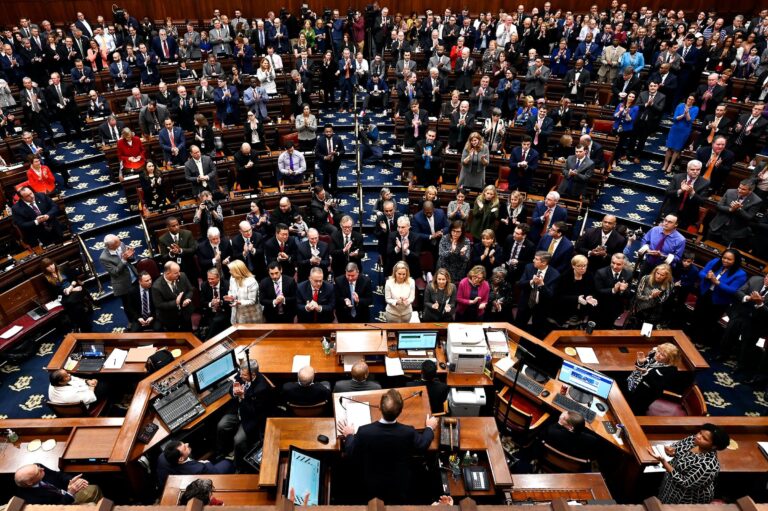State lawmakers are currently engaged in a heated debate over the potential repeal of a decades-old ban on happy hour promotions. The longstanding restriction, which prohibits discounted drink specials during certain hours, has sparked controversy among legislators, business owners, and public health advocates. Supporters argue that ending the ban could boost the hospitality industry and attract more customers, while opponents warn of possible negative effects on public safety and alcohol consumption. The outcome of this legislative discussion could signal a major shift in the state’s approach to alcohol regulation.
Table of Contents
- State Lawmakers Weigh Impact of Repealing Happy Hour Restrictions
- Economic Benefits and Public Safety Concerns Shape the Debate
- Voices from the Hospitality Industry Advocate for Regulatory Flexibility
- Proposed Measures Aim to Balance Business Growth with Responsible Drinking
- The Conclusion
State Lawmakers Weigh Impact of Repealing Happy Hour Restrictions
State legislators are currently evaluating proposals that could dismantle decades-old restrictions on happy hour promotions, a move that has sparked a lively debate on both public safety and economic growth. Supporters argue that repealing these bans would invigorate local businesses, providing bars and restaurants with the flexibility to attract more patrons and drive revenue during traditionally slower hours. In contrast, opponents caution that loosening these regulations might lead to increased incidents of overconsumption and related public health concerns.
Key points fueling the debate include:
- Potential boost in hospitality sector profits and job creation
- Concerns over increased alcohol-related accidents and impaired driving
- The historic rationale behind the initial bans, which aimed to curb excessive drinking
- Opinions from community groups, law enforcement, and business owners weighing in on the bill
Economic Benefits and Public Safety Concerns Shape the Debate
Proponents argue that lifting the decades-old happy hour ban could revitalize local economies by increasing foot traffic in bars and restaurants, especially during slower weekday hours. They highlight the potential for increased sales revenue,job creation,and greater tourism appeal as key economic benefits. Supporters also emphasize that modern regulations and responsible service training can mitigate risks associated with increased alcohol consumption.Among the anticipated advantages are:
- Boosted income for hospitality businesses struggling post-pandemic
- Expanded employment opportunities for local workers
- Enhanced competitiveness with neighboring states allowing happy hours
Though,opponents caution that relaxing restrictions could exacerbate public safety issues,including higher rates of drunk driving,alcohol-related accidents,and disturbances in communities. They underscore concerns regarding vulnerable populations and law enforcement resources. Critics insist that the social costs may overshadow economic gains,urging for stricter enforcement of existing laws rather than repeal. Key public safety concerns cited include:
- Potential rise in impaired driving incidents linked to discounted drinks
- Increased strain on police and emergency services in nightlife districts
- Negative impact on community well-being and family safety
Voices from the Hospitality Industry Advocate for Regulatory Flexibility
Industry leaders emphasize the importance of adaptive regulations that reflect the evolving economic and social landscape. Advocates argue that the decades-old happy hour ban restricts businesses’ ability to engage guests in an increasingly competitive market. By allowing greater flexibility, hospitality venues such as bars, restaurants, and hotels can innovate promotional strategies that enhance guest experiences while driving revenue growth.
Voices from across the hospitality spectrum highlight key benefits of regulatory reform:
- Increased opportunities for small businesses to attract diverse clientele during traditionally slow hours
- Better alignment with modern consumer expectations for social and dining experiences
- Potential for job creation as venues expand operational hours and event programming
Proposed Measures Aim to Balance Business Growth with Responsible Drinking
Lawmakers have introduced a series of targeted initiatives crafted to foster economic advancement within the hospitality sector while upholding public health standards. Among the key proposals are enhanced licensing requirements and mandatory training programs designed to promote responsible alcohol service. These measures aim to equip business owners and staff with tools to identify and reduce excessive drinking, thereby protecting community safety without unduly restricting commercial opportunity.
Key features of the proposals include:
- Strict monitoring of promotional hours to minimize binge drinking risks
- Incentives for establishments that implement robust safety and service protocols
- Public awareness campaigns to educate patrons on responsible consumption
- Collaboration with local law enforcement for enforcement and community-based support
These balanced strategies reflect lawmakers’ intent to stimulate growth in the vibrant nightlife economy while preserving the community’s well-being through measured, transparent regulation.
The Conclusion
As the debate continues, the potential repeal of the decades-old happy hour ban stands to reshape social and economic dynamics within the state. Lawmakers remain divided, weighing the cultural implications against public health and safety concerns. The coming weeks will be critical as stakeholders await further legislative developments that could finally bring an end to the long-standing prohibition.

